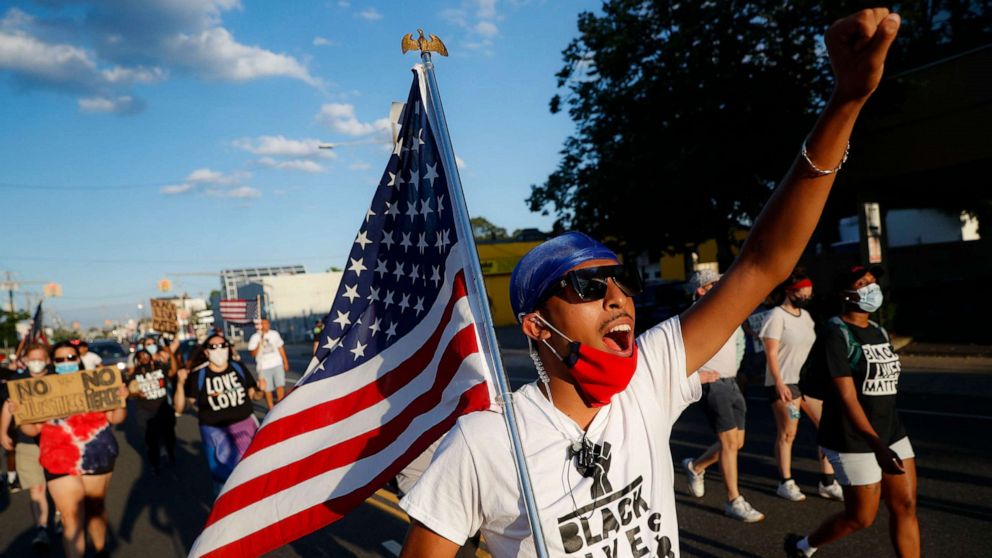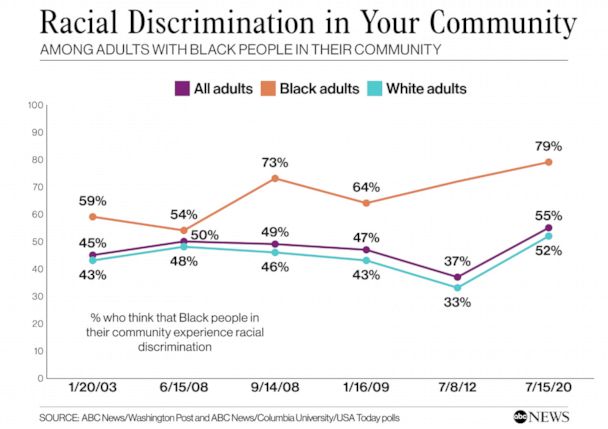


Sixty-three percent of Americans support the Black Lives Matter movement and a record 69% -- the most by far in 32 years of polling -- say Black people and other minorities are denied equal treatment in the criminal justice system, two of several signs of deep changes in public attitudes on racial discrimination.
These views don't necessarily translate into majority preferences on policy -- 55% oppose reducing police funding in favor of more social services, for instance, with 40% in favor. Nonetheless, this ABC News/Washington Post poll finds substantial shifts in how Americans view underlying issues of racial justice. Among them:
• Fifty-five percent in this poll, produced for ABC News by Langer Research Associates, say Black people who live in their own community experience racial discrimination, up from a low of 37% in 2012 and the most since the question was first asked 17 years ago. Among whites, 33% in 2012 saw racial discrimination in their own communities; today this has grown to 52%. It's also at 52% among Hispanic people.

• The share of Americans overall who say Black people and other minorities do not receive equal treatment in the criminal justice system has jumped 15 percentage points just since 2014, and 31 points from a low in 1997, to the most in a question that dates to 1988. Among whites, it's up from 44% six years ago to 62%, a majority for the first time. Here, again, views among Hispanics more closely resemble those among whites -- 68% perceive unequal treatment in the criminal justice system.
• The number of whites who are confident that police are adequately trained to avoid using excessive force has dropped by 12 points since 2014, from 62 to 50%. Again, it's about the same among Hispanics at 51%. Confidence among whites that the police treat white and Black people equally is down eight points, to 55%. It's also down 11 points among Blacks, to just 10%.
• Fifty-five percent of Americans overall see the recent killings of unarmed Black people by police as "a sign of broader problems" in police treatment of Blacks, rather than as isolated incidents. That's up from 43% in 2014, after the deaths of Eric Garner in New York City and Michael Brown in Ferguson, Missouri. Seeing this as a broader problem is up 13 points among whites, to 48%, as well as 12 points among Black people. Among Hispanics, 54% see recent killings as a sign of broader problems.
See PDF for full results, charts and tables.
Along with these changes, the survey also finds increased social contact: Eighty-five percent of whites now say there's a Black person they consider a fairly close personal friend, up from 54% when first asked in 1981. And 89% of Black people say the same about a white person, up from 69% 39 years ago.
On policy matters, as noted, the public overall, by 55-40%, opposes reducing funding for police departments and spending that money on social services instead; substantially more are strongly opposed, 43%, than strongly in favor, 25%. There's a racial and ethnic division on this issue: Fifty-nine percent of Black people support reducing police funding; it's 47% among Hispanics and drops to 34% among white people.
Also, Americans overall side -- by eight or nine points -- against renaming military bases currently named for Confederate generals, 50 to 42%, and against removing statues honoring Confederate generals in public places, 52 to 43%. Results are more lopsided on the question of removing statues honoring U.S. presidents who owned slaves, with 68% opposed.
MORE: Historians debate America's history of racism and Confederate monumentsOn another policy question, the public at 63 to 31%, opposes paying money to Black Americans whose ancestors were slaves as compensation for that slavery. That said, support for reparations has grown from 19% in 1997 and opposition is down 14 points, from 77%.
This change has come across groups, if not to the same degree. Support for reparations has risen from 65% of Blacks in 1997 to 82% now; and among whites has risen from 10% in 1997 to 18% now.
There are racial and ethnic gaps on the other policy items as well. Sixty percent of Black people favor renaming military bases, as do 51% of Hispanics, compared with 36% of whites. On Confederate statues, 76% of Black people favor removal; this declines to 38% of whites and 34% of Hispanics. And 60% of Blacks support removing statues of slave-owning presidents, versus 26% of Hispanics and 16% of white people.
There also are large gaps on these issues on the basis of partisanship and ideology. Three-quarters of Democrats, including as many white Democrats, say Black people in their community experience racial discrimination. Fewer, but still 57% of independents, say the same. This drops to 29% of Republicans.
In another example, 80% of Republicans think the police treat Black and white people equally; this drops to 47% among independents and falls to 20% of Democrats, including 25% of white Democrats. There are similar differences in views of whether police are adequately trained to avoid the excessive use of force -- 77% of Republicans say they are, versus 45% of independents and 24% of Democrats.
Ninety-two percent of Democrats, including 91% of white Democrats, support the Black Lives Matter movement, as do a smaller majority of independents at 62% and dropping steeply to 28% of Republicans. By ideology, support ranges from 93% of liberals to 70% of moderates and 34% of conservatives.
Six in 10 Democrats also support reducing police funding in favor of social services, as do 42% of independents, compared with 14% of Republicans. And there are even bigger partisan gaps on renaming military bases and removing Confederate statues.
While there are limited differences between white and Black Democrats on most of these issues, there are wide gaps on two items, reparations and removing statues of slave-owning presidents. Using both Democrats and Democratic-leaning independents for an adequate sample size, 86% of Blacks who are Democrats or lean that way, support reparations; that drops to 35% of white leaned Democrats. And 63% of Black leaned Democrats support removing statues of presidents who owned slaves, versus 31% of white leaned Democrats.
About one in four Democrats is Black, compared with one in 10 independents and fewer than one in 100 Republicans.
MORE: Their painful bond: Black mothers speak out together on their unimaginable lossDifferences among some other groups also emerge. Sixty-two percent of women see police killings of unarmed Black people as a sign of broader problems rather than isolated incidents; 48% of men agree. And there are differences by education in terms of renaming military bases and removing Confederate statues. These are supported by six in 10 Americans with post-graduate educations, compared with roughly a third of those who haven't gone beyond high school.
This ABC News/Washington Post poll was conducted by landline and cellular telephone July 12-15, 2020, in English and Spanish, among a random national sample of 1,006 adults. Results have a margin of sampling error of 3.5 points, including the design effect. Partisan divisions are 30-24-39%, Democrats-Republicans-independents.
The survey was produced for ABC News by Langer Research Associates of New York, New York, with sampling and data collection by Abt Associates of Rockville, Maryland See details on the survey's methodology here.